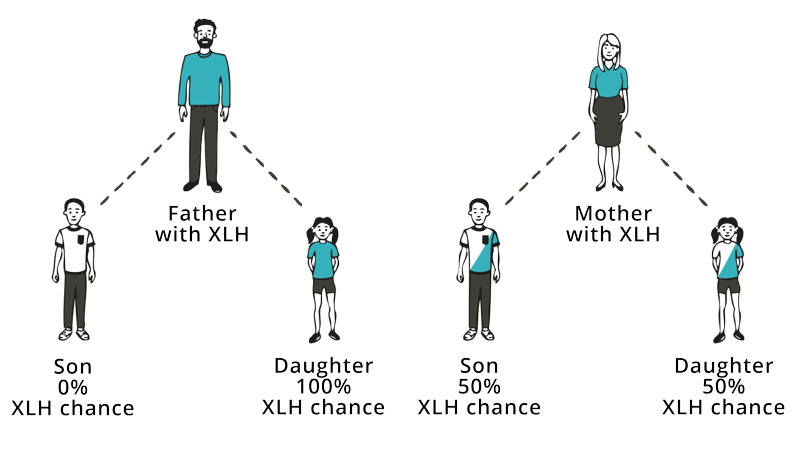Why genes matter

Chromosomes
Chromosomes carry the information for life and are found in nearly every cell in our bodies. Chromosomes are made from DNA and we have 46 of them – half (23) we get from our mother and half (23) from our father.
X and Y
The X- and Y-chromosomes are particularly important as they determine our gender. Women have two X-chromosomes while men have an X- and a Y-chromosome.
Genes are short sequences of DNA that provide code for specific proteins. XLH is caused by an alteration (mutation) in a gene called ‘PHEX’ on the X-chromosome (hence the ‘X-linked’). Around one in three people with XLH are born with this genetic change unexpectedly, but most inherit it from a parent.
Inheritance patterns of XLH
It’s important to remember that women’s cells have two X-chromosomes and men’s have an X- and Y-chromosome. To get XLH, you only need to have one X-chromosome that produces an altered PHEX gene. If a mother has XLH, then her children (both boys and girls) have a 50% chance of also having XLH. This is because all children inherit one X-chromosome from their mother. If a father has XLH, then only his daughters will have XLH because daughters always inherit an X-chromosome from their father. A son won’t get XLH because he gets his X-chromosome from his mother and only the Y-chromosome from the affected father. If a father and mother both have XLH, their sons will have a 50/50 chance of having XLH, but all their daughters will have XLH. You can see how this X-linked inheritance pattern makes XLH more likely among females.
PHEX and phosphate wasting
The mutation in the PHEX gene causes your body to make too much of a hormone called fibroblast growth factor 23 (FGF23). A key role of FGF23 is to control the amount of phosphate you have in your blood. When your body makes too much FGF23, your kidneys let too much phosphate pass into your urine – this process is called ‘phosphate wasting’. Low phosphate levels are behind most of the symptoms of XLH.
Managing your symptoms
Despite the common cause of XLH, the symptoms can vary widely from person to person and change over time. The symptoms that children with XLH experience are not the same as the symptoms that adults with XLH have.
How you or a member of your family experiences XLH can be completely different. The important thing is to speak with your healthcare team regularly to help manage the symptoms that are particular to you.



